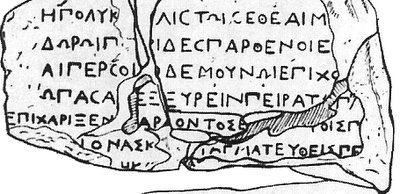Delphi Tablet III
 I posted in October on the Delphi tablet here and here. This image is piece #6323. However, I only have time for the first four lines at the moment.
I posted in October on the Delphi tablet here and here. This image is piece #6323. However, I only have time for the first four lines at the moment.Ἧ πολὺ κ[αλ]ίστωι σε θεαί, Μ[..., γέρησαν
Δώρωι Π[ιερ]ίδες παρθένοι ε[ὺπλόκαμοι]
Αίπερ σοι [τό]δε μούνωι ὲπιχθ[ονίων ἀνθρώπον,
Ὤπασα[ν] ἐξευρεῖν πείρατα πά[ντα τέχνης.] *
With this translation into German,
Wirklich mit einem sehr schonen Geschenk haben dich, M...
die schonehaarigen pierischen Jungfrauen geehrt
die dich als einzigen Mensche auf Erden damit
begabt haben, jegliche Grenzen der Kunst zu erfinden
Truly with a very great gift
have the beautiful haired Pieridean maidens
honoured you, who is the only human on earth
to whom it has been given to invent the very finisher of all arts
In plain English,
The Muses have truly honoured
you with a great gift,
for you to be the sole inventor
on earth of the ultimate art.
I have disagreed with the German translator somewhat on this phrase, πείρατα πάντα τέχνης. Or maybe I am unfamiliar with the German term 'Grenze der Kunst.' Πείρατα can refer to boundaries or borders, but it also is used for the goldsmiths tools, the finishers of art.
Here is Liddell and Scott.
I - an end as in the ends of the earth
II - the end or issue of a thing: the furthest point, the utmost verge: the chief or most important object.
III - that which finishes, a godsmith's tools are called πείρατα τέχνης, the finishers of art.
I am inclined to think now of this system on the Delphi tablet as a poetic device, or a way to represent phonology, or even an early example of a constructed script. After all, the name of the inventor was mentioned, although it has not been preserved in this fragment.
Any further comments are welcome, whether to improve my translation or otherwise.
* The bracketed letters have been cited by Boge from J. Bousquet, 1956.
Bibliography
Boge, Herbert. Griechische Tachygraphie und Tironische Noten. 1973. Akademie Verlag. Berlin.

3 Comments:
It's not quite right to say that peirata techne:s can mean goldsmith's tools.
The reference in LSJ is to Odyssey 3.434, part of a the scene of sacrifice: "the bronzesmith came holding in his hands the bronze tools, the peirata techne:s." He is going to be gilding the horns of the sacrificial victim.
So peirata techne:s is an adornment for "bronze tools" and is probably descriptive ("the tools of his trade") rather than a technical term for those tools.
The honoree should be a poet, since he receives the gifts of the Muses. If the suppletion "panta techne:s" is correct, the epigrammaticist was probably quoting the Odyssey. He gives his epigram point by finishing up with an example of a fancy trick of the poet's trade.
Thank you very much. I had hardly hoped for so much additional information. Would you venture a translation of the verse yourself.
Peirar (pl. peirata) is the version of the Attic prose word peras (pl. perata) found in poetry, specifically epic and archaic poetry.
The prose word means frontier, and like the English word means not just the limit, but distant regions close to the limit. LSJ gives as derived (?? perhaps figurative) extensions of this basic meaning: "perfection" (under peras) and "achievement, execution, mode or means of execution" (under peirar). They translate a text from Pindar (6 century BCE)as "he possesses the secret ( = power of execution) of my art", where the word translated as secret is peirata.
Then tagged onto the end, there is the definition "instrument, tool, esp. rope, tackle").
So the German translation Grenze is correct but pedestrian. If that were the only meaning there would be no reason to turn the text into verse.
But the poet of the epigram stuffs all the meanings and associations of the word, both prosaic and poetic: frontiers of poetry, perfection, supreme achievement, tools of the poetic trade, into his final three words peirata panta techne:s.
So the epigram not only states the honoree's merits, but illustrates them by a poetic phrase that uses literary allusion to combine the prose and poetic meanings. That's what makes it an epigram.
I'm not up to trying to translate that.
Gary
Post a Comment
<< Home